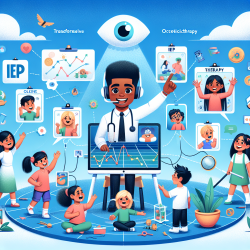Introduction
In the realm of speech-language pathology and related fields, the importance of understanding genetic influences on psychiatric disorders cannot be overstated. Recent research on Transcription Factor 4 (TCF4) offers valuable insights into its association with various psychiatric conditions, including Pitt-Hopkins Syndrome and schizophrenia. This blog post delves into the findings of a comprehensive review article on TCF4, highlighting its implications for practitioners and encouraging further research.
Understanding Transcription Factor 4
Transcription Factor 4 (TCF4) is a member of the helix-loop-helix (HLH) family of proteins, widely expressed throughout the body and playing a critical role during neural development. Mutations in the TCF4 gene are linked to Pitt-Hopkins Syndrome, a severe autism spectrum disorder characterized by intellectual disability, absence of speech, and other developmental delays. Additionally, TCF4 polymorphisms have been associated with schizophrenia and other psychiatric disorders.
Key Findings from the Research
The research article, "Transcription factor 4 and its association with psychiatric disorders," provides a detailed review of TCF4's functions and the pathophysiological mechanisms associated with its genetic variants. Here are some key takeaways:
- Role in Neural Development: TCF4 is abundantly expressed during neural development, indicating its significance for the nervous system. It influences neural progenitor cell maintenance and differentiation, impacting brain development and function.
- Association with Psychiatric Disorders: Genome-wide association studies (GWAS) have identified TCF4 polymorphisms linked to schizophrenia, bipolar disorder, and other psychiatric conditions. These polymorphisms are often found in non-coding regions, with mechanisms of disease onset still under investigation.
- Pitt-Hopkins Syndrome: Mutations in TCF4 are a known cause of Pitt-Hopkins Syndrome, with a wide range of phenotypic variability. Understanding the spectrum of TCF4 mutations can aid in clinical diagnosis and treatment protocols.
Implications for Practitioners
For practitioners in speech-language pathology and related fields, the insights from this research can enhance understanding and inform clinical practice:
- Early Identification: Awareness of TCF4's role in developmental disorders can aid in the early identification and intervention for children at risk of Pitt-Hopkins Syndrome or related conditions.
- Personalized Interventions: Understanding the genetic underpinnings of psychiatric disorders can lead to more personalized and effective intervention strategies, tailored to the specific needs of each child.
- Encouraging Further Research: Practitioners are encouraged to stay informed about ongoing research in this area, as new findings could further elucidate the role of TCF4 in psychiatric disorders and improve therapeutic outcomes.
Conclusion
The research on Transcription Factor 4 underscores its critical role in neural development and its association with various psychiatric disorders. For practitioners dedicated to improving outcomes for children, staying informed about genetic influences and emerging research is essential. To read the original research paper, please follow this link: Transcription factor 4 and its association with psychiatric disorders.










